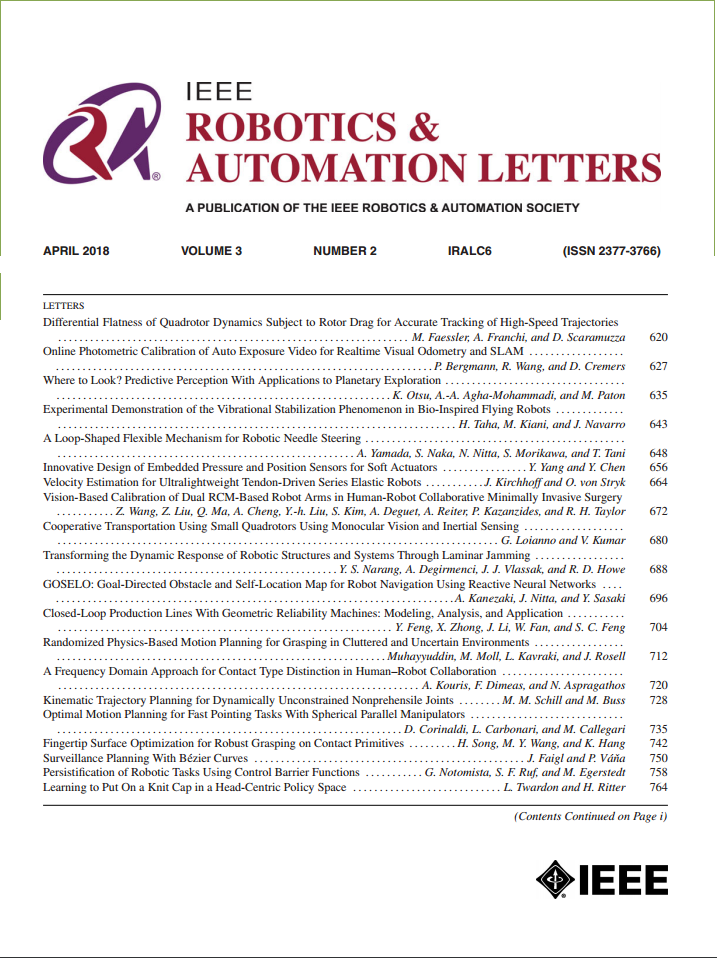学习采样字典用于具有变换器的高效通用机器人运动规划
IF 4.6
2区 计算机科学
Q2 ROBOTICS
引用次数: 3
摘要
运动规划是自动驾驶、手术机器人和工业机械手等机器人应用不可或缺的一部分。现有的规划方法缺乏对高维空间的可扩展性,而最近的基于学习的规划者在加速基于采样的运动规划者(SMP)方面表现出了希望,但缺乏对分布外环境的可推广性。为了解决这个问题,我们提出了一种新的方法,矢量量化运动规划变换器(VQ-MPT),它克服了以前基于学习的方法的关键泛化和缩放缺点。VQ-MPT由两个阶段组成。阶段1是矢量量化变分自动编码器模型,其学习使用有限数量的采样分布来表示规划空间,而阶段2是自动回归模型,其通过从学习的采样分布集中进行选择来构建SMPs的采样区域。通过将大的规划空间划分为离散集并选择性地选择采样区域,我们的规划器与开箱即用的SMPs很好地配对,比没有VQ-MPT的帮助更快地生成接近最优的路径。它的可推广性在于,它可以应用于不同复杂性的系统,从2D平面到14D双手操作机器人,具有不同的环境表示,包括成本图和点云。经过训练的VQ-MPT模型可以推广到训练过程中看不到的环境中,并比以前的方法获得更高的成功率。本文章由计算机程序翻译,如有差异,请以英文原文为准。
Learning Sampling Dictionaries for Efficient and Generalizable Robot Motion Planning With Transformers
Motion planning is integral to robotics applications such as autonomous driving, surgical robots, and industrial manipulators. Existing planning methods lack scalability to higher-dimensional spaces, while recent learning-based planners have shown promise in accelerating sampling-based motion planners (SMP) but lack generalizability to out-of-distribution environments. To address this, we present a novel approach, Vector Quantized-Motion Planning Transformers (VQ-MPT) that overcomes the key generalization and scaling drawbacks of previous learning-based methods. VQ-MPT consists of two stages. Stage 1 is a Vector Quantized-Variational AutoEncoder model that learns to represent the planning space using a finite number of sampling distributions, and stage 2 is an Auto-Regressive model that constructs a sampling region for SMPs by selecting from the learned sampling distribution sets. By splitting large planning spaces into discrete sets and selectively choosing the sampling regions, our planner pairs well with out-of-the-box SMPs, generating near-optimal paths faster than without VQ-MPT's aid. It is generalizable in that it can be applied to systems of varying complexities, from 2D planar to 14D bi-manual robots with diverse environment representations, including costmaps and point clouds. Trained VQ-MPT models generalize to environments unseen during training and achieve higher success rates than previous methods.
求助全文
通过发布文献求助,成功后即可免费获取论文全文。
去求助
来源期刊

IEEE Robotics and Automation Letters
Computer Science-Computer Science Applications
CiteScore
9.60
自引率
15.40%
发文量
1428
期刊介绍:
The scope of this journal is to publish peer-reviewed articles that provide a timely and concise account of innovative research ideas and application results, reporting significant theoretical findings and application case studies in areas of robotics and automation.
 求助内容:
求助内容: 应助结果提醒方式:
应助结果提醒方式:


